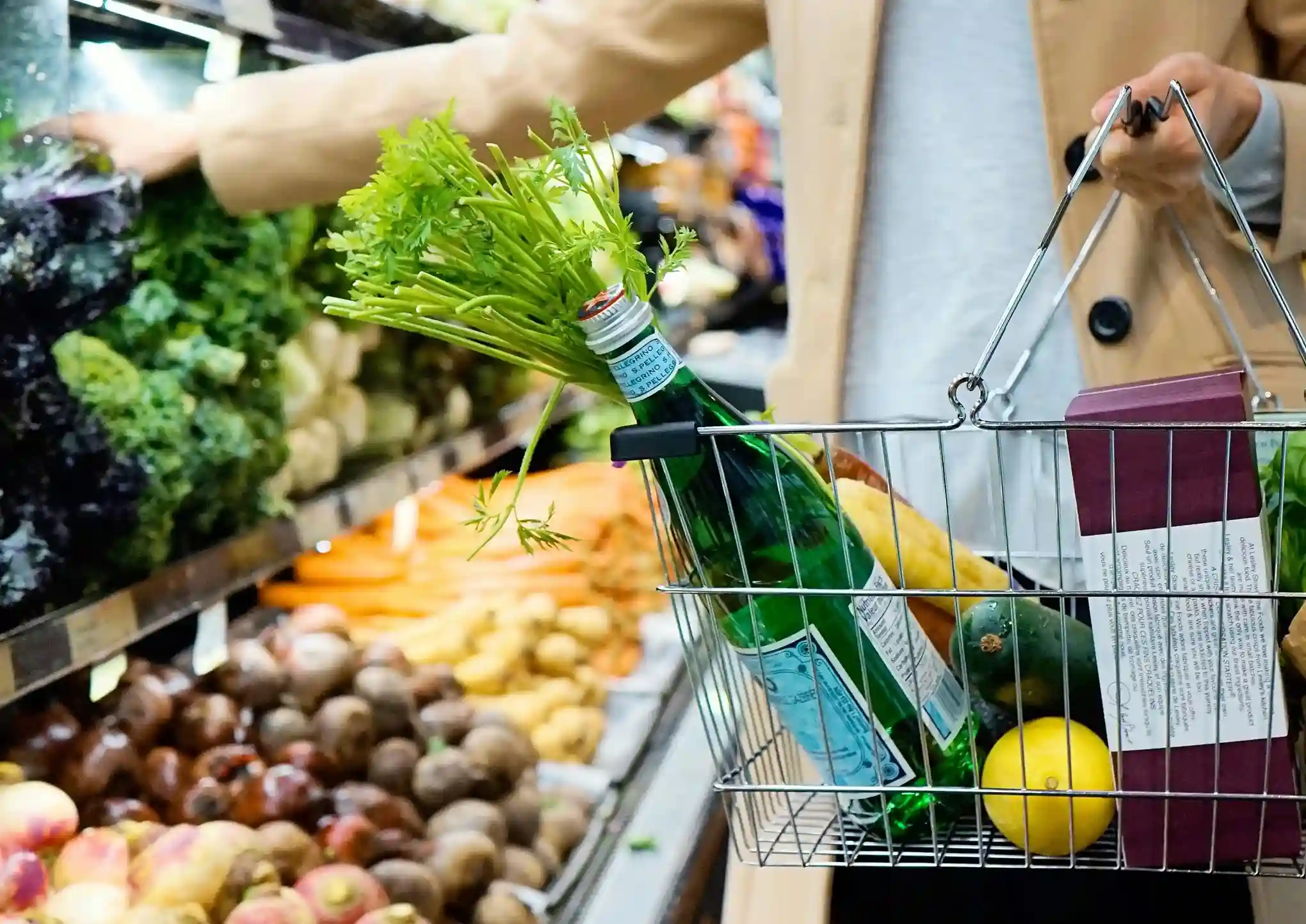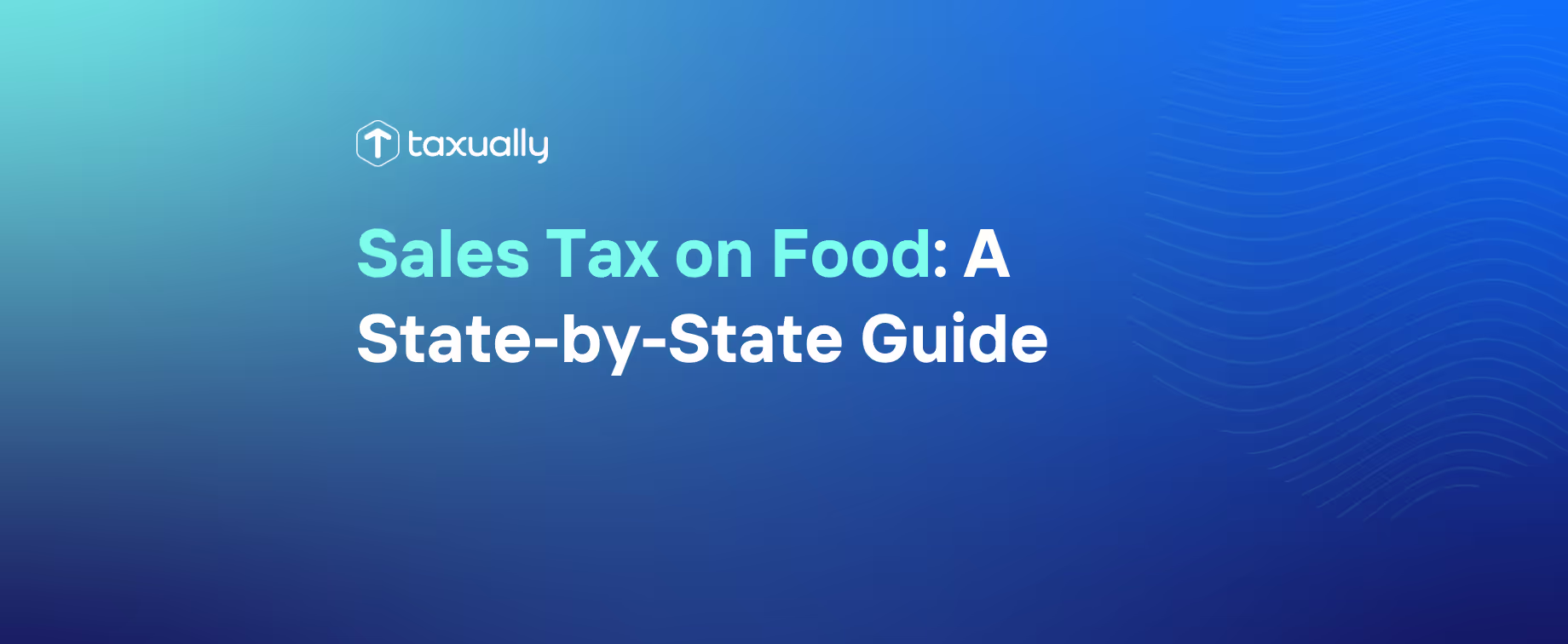Key takeaways
- Grocery vs. prepared food: Most states exempt basic grocery items from sales tax, but prepared or hot food, especially when sold with eating utensils, is typically taxable.
- Rules vary by state and locality: Tax rates and definitions differ widely, and some local jurisdictions apply their own rules on top of state guidelines.
- Online and multistate sellers must stay alert: If your business meets economic nexus in a state, you may need to collect tax even on groceries, particularly if selling via marketplaces or across borders.
Sales tax on food varies widely across the United States. While many states consider basic grocery items tax-exempt, others apply full or reduced rates. The tax treatment also depends on how food is sold—prepared food sales from restaurants, bakery items sold with utensils, or frozen meals for immediate consumption are typically taxed, even when groceries are not.
If your business sells food products, understanding when to charge sales tax is essential. This guide offers a clear breakdown of how states approach food sales, covering grocery tax, restaurant meals, hot food, and more.

Is food taxable?
The answer depends on what type of food you're selling, where you're selling it, and how it's prepared. Here’s a breakdown of how states generally treat different categories of food items:
- Grocery items: These include staple foods and food ingredients such as bread, dairy, fruits, and vegetables. Many states exempt these from sales tax or apply a reduced grocery tax.
- Prepared food: Typically includes hot food, frozen meals, rotisserie chicken, or anything heated by the seller or served with eating utensils provided (including other eating utensils like napkins and forks). These are usually taxable.
- Restaurant meals: Almost always taxed at the full rate, as they are intended for immediate consumption.
- Bakery items: These may be exempt when sold as groceries, but if they are consumed on-site or sold with utensils, they may be taxed.
- Convenience store sales: Food ready to eat or heated by the seller is typically taxed, while packaged groceries are often exempt.
- Non-alcoholic beverages, dietary supplements, and alcoholic beverages: Generally subject to full sales tax in all states, although there are exceptions.
Understanding whether food purchased is considered for immediate consumption or home preparation is key to determining taxability.
State-by-state guide to sales tax on food
Alabama
- Grocery tax: 3% state rate (reducing to 2% on September 1, 2025), plus local.
- Prepared food: Taxable.
- Bakery items: Exempt if not for immediate consumption.
Alaska
- No state sales tax.
- Local jurisdictions may tax food items, including groceries and prepared meals.
Arizona
- Grocery tax: Exempt.
- Prepared food and restaurant meals: Taxable.
- Food sold hot or with utensils: Taxable.
Arkansas
- Groceries: Taxed at 0.125%.
- Prepared food sales: Taxable.
- Includes food ingredients mixed, heated, or served for immediate consumption.
California
- Grocery items: Exempt.
- Hot food, meals sold with eating utensils provided: Taxable.
- Bakery items: Exempt unless ready to eat or sold with utensils.
Colorado
- Grocery tax: Exempt.
- Prepared food and restaurant meals: Taxable.
- Local jurisdictions may apply their own rules.
Connecticut
- Groceries: Exempt.
- Prepared meals, hot food, potato salad, and food served hot or ready to eat: Taxable.
Delaware
- No state sales tax.
- Food businesses are subject to gross receipts tax.
Florida
- Groceries: Exempt.
- Prepared meals and convenience store hot foods: Taxable.
- Vending machine food: Taxable.
Georgia
- Groceries: Exempt from state tax; local tax may apply.
- Prepared food sales, including food heated by the seller: Taxable.
Hawaii
- All food sales are subject to general excise tax.
- No exemption for groceries.
Idaho
- Groceries: Fully taxable; residents may claim a credit.
- Prepared food, including meals from restaurants: Taxable.
Illinois
- Grocery tax: 1% (set to be eliminated January 1, 2026). However, municipalities will have the option to retain a 1% grocery tax.
- Prepared food: Fully taxable.
- Includes food served with utensils or eaten on-site.
Indiana
- Groceries: Exempt.
- Prepared food sales, frozen meals, and items with eating utensils provided: Taxable.
Iowa
- Grocery items: Exempt.
- Hot food, prepared meals, food eaten on-site: Taxable.
Kansas
- Grocery tax: 0% from 2025. Local taxes may apply.
- Prepared food and restaurant meals: Taxable.
Kentucky
- Grocery tax: Exempt.
- Prepared food and anything ready to eat: Taxable.
Louisiana
- Groceries: Exempt.
- Prepared meals, bakery items sold with utensils: Taxable.
Maine
- Grocery items: Exempt.
- Prepared food, rotisserie chicken, food sold hot: Taxable.
Maryland
- Groceries: Exempt.
- Prepared food: Taxable.
- Includes any food heated by the seller or served for immediate consumption.
Massachusetts
- Grocery tax: Exempt.
- Restaurant meals, hot food, or food eaten on-site: Taxable.

Michigan
- Groceries: Exempt.
- Prepared food: Taxable, including food items sold hot or with utensils.
Minnesota
- Groceries: Exempt.
- Prepared food: Taxable.
- Includes food transported hot or assembled to be eaten without further prep.
Mississippi
- Grocery tax: Full rate (7%).
- Prepared food: Taxable.
Missouri
- Groceries: 1.225% rate.
- Prepared meals and restaurant food: Fully taxable.
Montana
- No general sales tax.
- Some resort areas may impose a food tax locally.
Nebraska
- Groceries: Exempt.
- Prepared meals: Taxable.
Nevada
- Grocery tax: Exempt.
- Prepared food: Taxable if served hot or with utensils.
New Hampshire
- No general sales tax.
- Meals and prepared food are taxed at 8.5%.
New Jersey
- Groceries: Exempt.
- Prepared meals, hot foods, food with utensils: Taxable.
New Mexico
- Grocery items: Exempt from gross receipts tax.
- Prepared meals: Taxable.
New York
- Groceries: Exempt.
- Prepared food, hot or served with utensils: Taxable.
North Carolina
- Groceries: Exempt from state tax; local applies.
- Prepared meals: Fully taxable.
North Dakota
- Grocery tax: Exempt.
- Restaurant meals and prepared food: Taxable.
Ohio
- Groceries: Exempt.
- Prepared food, rotisserie chicken, food for immediate consumption: Taxable.
Oklahoma
- Groceries: Taxable.
- Prepared food: Taxable.
Oregon
- No sales tax.
Pennsylvania
- Grocery items: Exempt.
- Prepared food, including anything heated by the seller or sold with utensils: Taxable.
Rhode Island
- Groceries: Exempt.
- Prepared food, bakery items sold hot or ready to eat: Taxable.
South Carolina
- Groceries: Exempt.
- Restaurant meals, food ready to eat: Taxable.
South Dakota
- Grocery tax: 4.2% standard sales tax rate.
- Prepared meals: Taxable.
Tennessee
- Groceries: 4% reduced rate.
- Prepared meals and hot food: Fully taxable.
Texas
- Groceries: Exempt.
- Prepared food, hot items, and those with eating utensils provided: Taxable.
Utah
- Grocery tax: 3% (1.75% reduced state rate + 1% local + 0.25% county).
- Prepared meals: Taxable.
Vermont
- Groceries: Exempt.
- Prepared food, including bakery items sold for immediate consumption: Taxable.
Virginia
- Groceries: Exempt.
- Restaurant meals, prepared food: Fully taxable.
Washington
- Grocery items: Exempt.
- Prepared food, hot food, meals from convenience stores: Taxable.
West Virginia
- Groceries: Exempt.
- Prepared meals: Taxable.
Wisconsin
- Groceries: Exempt.
- Prepared food, including food heated by the seller or served with utensils: Taxable.
Wyoming
- Groceries: Exempt.
- Prepared meals: Taxable.
Sales tax implications for businesses
For any business involved in food sales, staying compliant with sales tax rules is essential, especially when operating across states or selling online.
Important considerations:
- Nexus obligations: If you have economic nexus or a physical presence in a state, you may be required to collect sales tax, even on grocery items if taxed locally.
- Product classification: Clearly distinguish between tax-exempt groceries and taxable sales of prepared food, hot food, or items sold with eating utensils provided.
- Local variations: States may allow local jurisdictions to impose their own tax rules. For example, bakery items sold in one city might be taxable but exempt in another.
- Online sellers: If you sell food products online—via your website or marketplaces—you may still have to charge sales tax in states where you meet the economic nexus threshold. Marketplace facilitators may handle collection, but you’re responsible for compliance.
Conclusion
While many states exempt grocery items from tax, others apply full or partial rates depending on whether the food is heated by the seller, sold with eating utensils provided, or intended for immediate consumption. From restaurant meals to bakery items sold hot, every detail matters.
If you sell food products, whether in a convenience store, restaurant, or even online, understanding your obligations around sales tax on food is critical. Always double-check for local jurisdiction variations and stay updated with state changes to ensure compliance.
Do you need help with your sales tax compliance? Book a free call with one of our sales tax experts to find bespoke solutions for your business, optimize your tax costs, and reach millions of new potential customers.
Frequently asked questions
New Year's Day - 1/1/2024Memorial Day - 5/27/20244th of July - 7/4/2024Labor Day - 9/2/2024Thanksgiving Day - 11/28/2024Day after Thanksgiving - 11/29/2024Christmas Eve - 12/24/2024Christmas Day - 12/25/2024
Is food taxable in the U.S.?
It depends. Many states exempt groceries but tax prepared food, hot meals, and items sold with utensils. Rules vary by state and locality.
What’s the difference between groceries and prepared food?
Groceries include staple items like bread, milk, and produce, often exempt from tax. Prepared food is typically ready to eat or heated by the seller, and usually taxed.
Are bakery items taxable?
They’re often exempt if sold for home consumption. However, bakery items sold hot, eaten on-site, or with utensils are usually taxable.
How do local sales taxes affect food sales?
Some states allow local jurisdictions to apply their own rules. This means the same food item could be taxed in one city and not in another.
Do online food sellers need to collect sales tax?
Yes—if you meet economic nexus in a state, you may need to charge sales tax, even on exempt groceries. Marketplace facilitators may collect on your behalf, but you're still responsible for compliance.
What’s the sales tax rate on food in my state?
Rates and rules vary widely. Check the state-by-state guide above for detailed information on grocery and prepared food tax treatment in your state.



















